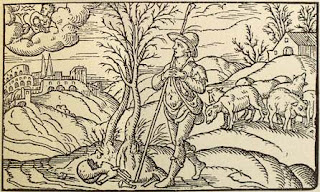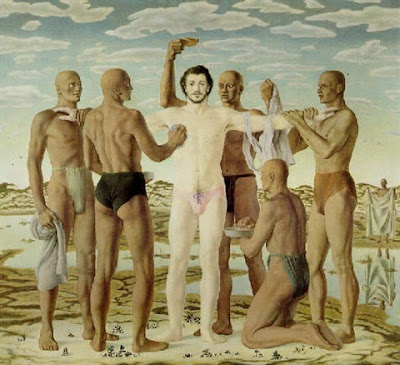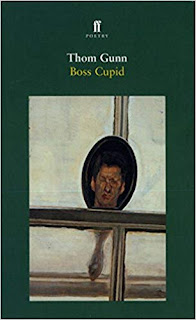Gay Poetry and Transgression/Bull Shit and Bull Eclogues: Part 5 (of 7)

Currently, on Lambda Literary Blog, Saeed Jones has opened up a debate on the connection between gay identity and poetry. His article emerges from an interesting debate that ran on his blog about a year ago: What makes a poem gay? A debate to which Jee Leong Koh contributed. This debate has some bearing on “Bull Eclogues”.
An overview of that debate looks like this. According to Jerome Murphy, the gay poet is fragranced with “lavender”. Such intimates a weak stereotype. Think "Cavafy". (A contestable start indeed). He wishes for a stronger image and suggests that the gay poet is a “trickster” with “double vision”. That is worth considering. The double vision was literal in Robert Duncan’s case…which became a metaphor for his double-meaning world of Hermeticism. For Duncan, puns opened up depths within language, crossways at which the divine entered. Yes, the gay poet has always been a “trickster”, in the sense explored by Lewis Hyde in Trickster Makes This World. The gay poet seeks a “disruptive imagination”. Unfortunately, Jerome Murphy then dissolves the gay poet into the acid of alchemical Hermaphroditism: all great poets are Androgynes, so sexuality doesn’t really matter in the long run because poetry is all about touching this deep, contradictory level. He wishes to ‘complicate the idea of “gay”’ into a transgressive“sensibility” that pervades all great works of art. There is a world of difference, however, between the gay poet…and Sylvia Plath (his example) writing like Eliot and being a man-woman…and there is an even bigger difference between Plath and H.D. as a Gyandrous, Lesbian poet subverting a whole psychological, spiritual, cultural tradition to create Trilogy. And yes, there is a chasm between the notion of a gay poet with lavender deoderant and Essex Hemphill writing as a Black gay poet (in Vital Signs) under the guidance of the rebellious Signifying Monkey.
Dante Micheaux entered the debate at a more basic level: the gay poet writes about homoerotic desire and gay poetry includes that desire. That is equivalent to Dr Samuel Johnson kicking a rock to show that the world existed outside the mind. What is gay poetry if it does not connect to gay experience (which can of course be very wide)?
Ocean Vuong positioned himself somewhere between the two: sexuality is part of the gay poet, but that sexuality should not “overshadow” the poem. Non-gay readers should be able to find some point of emotional identification within the poem, so as it still speaks to them.
Putting these practical views together, the gay poet emerges as someone who writes about same sex love, but is able to universalize the emotions such that they speak beyond gay culture: Eros gives way to Apollo. And the gay poet is a transgressor, a contradictory messenger: Hermes.
Saaed Jones, in his recent Lambda article, rather throws himself into the Jerome Murphy camp, ignoring the assimilation suggested on his blog. The gay poet has been transformed into the Queer Poet. Homoerotic desire is insignifcant, the gay poet/queer poet is simply a transgressive agent: s/he queers language,and shows an allegiance to all writers who have a bent to twist language into new forms. Vocabulary and syntax make identity:
An overview of that debate looks like this. According to Jerome Murphy, the gay poet is fragranced with “lavender”. Such intimates a weak stereotype. Think "Cavafy". (A contestable start indeed). He wishes for a stronger image and suggests that the gay poet is a “trickster” with “double vision”. That is worth considering. The double vision was literal in Robert Duncan’s case…which became a metaphor for his double-meaning world of Hermeticism. For Duncan, puns opened up depths within language, crossways at which the divine entered. Yes, the gay poet has always been a “trickster”, in the sense explored by Lewis Hyde in Trickster Makes This World. The gay poet seeks a “disruptive imagination”. Unfortunately, Jerome Murphy then dissolves the gay poet into the acid of alchemical Hermaphroditism: all great poets are Androgynes, so sexuality doesn’t really matter in the long run because poetry is all about touching this deep, contradictory level. He wishes to ‘complicate the idea of “gay”’ into a transgressive“sensibility” that pervades all great works of art. There is a world of difference, however, between the gay poet…and Sylvia Plath (his example) writing like Eliot and being a man-woman…and there is an even bigger difference between Plath and H.D. as a Gyandrous, Lesbian poet subverting a whole psychological, spiritual, cultural tradition to create Trilogy. And yes, there is a chasm between the notion of a gay poet with lavender deoderant and Essex Hemphill writing as a Black gay poet (in Vital Signs) under the guidance of the rebellious Signifying Monkey.
Dante Micheaux entered the debate at a more basic level: the gay poet writes about homoerotic desire and gay poetry includes that desire. That is equivalent to Dr Samuel Johnson kicking a rock to show that the world existed outside the mind. What is gay poetry if it does not connect to gay experience (which can of course be very wide)?
Ocean Vuong positioned himself somewhere between the two: sexuality is part of the gay poet, but that sexuality should not “overshadow” the poem. Non-gay readers should be able to find some point of emotional identification within the poem, so as it still speaks to them.
Putting these practical views together, the gay poet emerges as someone who writes about same sex love, but is able to universalize the emotions such that they speak beyond gay culture: Eros gives way to Apollo. And the gay poet is a transgressor, a contradictory messenger: Hermes.
Saaed Jones, in his recent Lambda article, rather throws himself into the Jerome Murphy camp, ignoring the assimilation suggested on his blog. The gay poet has been transformed into the Queer Poet. Homoerotic desire is insignifcant, the gay poet/queer poet is simply a transgressive agent: s/he queers language,and shows an allegiance to all writers who have a bent to twist language into new forms. Vocabulary and syntax make identity:
If we embrace poetry as a means of making/re-making realities, we are queer poets, not because of who we sleep with and love, but because of what we do to the world – and how.
I believe that this is a fundamentally misguided approach which has grown out of previously half-understood ideas about Hermeticism and disruptive imagination. And it begs this question: does transgressive language necessarily make a valuable poem or identity?
…When I write, I try to write as good a poem as I can, and I do not think about how gay it is. When I read, I ask myself if the poem is any good, and not if the poem is any[way] gay.
That was a cautious, introductory answer! And it suggests a different direction to the debate which followed. He is primarily a poet who serves Apollo. He is interested in whether a poem is “good” not how far it transgresses, not whether it is gay /queer. Yet, included in that “good” is a desire to subvert historical forms, to play technique against emotion (drawn from his experiences as a gay man).
“Bull Eclogues” is a trangressive sequence: its mythology begins with sexual transgression and the birth of the Minotaur. It deals with homoerotic desire. It speaks with a wider cultural resonance. It seeks a transgressive sonnet language that will deal with religious trespass. And it is within this context that a study for a self-portrait begins.



Comments